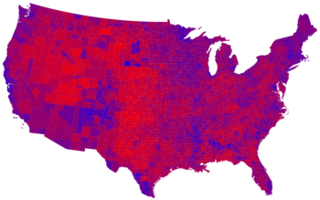
Another election has come and gone. And we have, like so many electorates, thumbed the incumbents down. We've balanced the power of the blues; we've red shifted to the right. Which seems a little odd, when you look at the 2008, county-by-county election map, attached. Because, to the untrained eye, we were already coast-to-coast red.
What accounts for that idiocy? Why are so many of us in flyover country -- across what NYT journalist David Brooks memorably labeled the "meatloaf line" -- so obstinately obsessed with QVC, ATVs, Cracker Barrels and year round Christmas ornament stores, and so boorishly ignorant about NPR, MV (Martha's Vineyard), Buddhism and pad thai?
Well, for one thing, it's because we don't have as much money. People in Alabama, Arkansas, Indiana and Kentucky averaged personal incomes in the low $30Ks last year; people in Connecticut and New Jersey averaged in the low $50Ks, people in Massachusetts came close at $49K plus change, and people in DC were the big winners at $66K. Meatloaf tastes good when you work hard, and ground meat from local chain stores is the best you can afford.
For another thing, it's because we don't support a large dependant class. We are less ethnically, less religiously, and less economically diverse. We mow our own lawns; we pick our own beans; we raise our own babies; we shop for our own ground beef. Coastal states aren't just richer, per capita, on average, than states in the Midwest; the income variance -- the Gini coefficient -- is larger. The lowest quintile brings in less than 3% of all income in the state of New York, where the highest quintile brings in more than 50%; but the disparity is greatest in DC, where the figures were 1.9% and 56.3%, respectively, back in 2006. For every NPR-listening, MV-vacationing Northeasterner, there's a salsa dancer in low-income housing, or two.
Half a century ago, when Northeasterners were headed to Woodstock, a pugilistic anthropologist from Port Austin, Michigan, was headed to the Orinoco River Basin. After a few decades, Napoleon Chagnon had discovered that the indigenous people he'd learned to love lived in two different kinds of groups. Some, the more "civilized" Yanomamö, occupied the low lying, flat areas, that were crisscrossed by tributaries and small rivers -- areas richer in natural resources, like games animals and garden lands. But others, the less "civilized" Yanomamö, had headed out to the hinter territory -- they occupied the highlands, where it was harder to plant crops or hunt. Lowland villages, like Mishimishimaböwei-teri, were bigger, with upwards of 300 or 400 people; highland villages, like Narimöböwei-teri, were smaller, with, say, 40 to 80 people. And there were other differences. Lowland villages were more "bellicose": they made war more often, and their headmen were more fierce. Highland villages wore more "gentle": they made war less often, and captured fewer women; their headmen were more sedate, and had fewer wives. Highlanders were probably poorer than lowlanders overall, with less variance in political clout, resource access, and family size.
The first great civilizations, as Robert Carneiro pointed out in a classic, 1970 paper in Science, were invariably found on areas of circumscribed agricultural land. Babylon was built on the Euphrates; Memphis was on the Nile. People there were no doubt much richer, on average, than in the Arabian or Sahara Desert nearby. But the variance -- in power, money, and sex -- was enormous.
Civilized -- oh, what the heck, civilised -- people inhabit the greatest places on earth. Ten thousand years ago, those places were rivers. These days, they're mostly seacoasts. Where there's money in farming, cities spring up on the alluvium. Where there's money in trade, they spring up around ports. Long ago, the Athenians built an empire on the Aegean; and the Romans made Middle Earth a Roman lake. Some 21st-century civilizations are sitting on natural resources, but most are sitting on coasts. Think Los Angeles, think New York.
Out here in the hinterlands, we're more egalitarian. We are the unwashed, barbarian hordes Tacitus pretended to admire; we're Wagon Train cowboys, spread out across the undifferentiated prairies. Our kids all play on the same sports teams, then we all eat together at Cracker Barrel. It's just awful.
And, on an almost inexplicable note, emigration in the US in the 21st century tends to be away from, not toward, the coasts. Get along little doggies. Gotta love them ATVs.
References
Betzig, Laura. 2009. But what is government itself but the greatest of all reflections on human nature? Politics and the Life Sciences, 28: 101-105.
Betzig, Laura. 2010. The end of the republic. In J. Silk and P. Kaepper, eds. Mind the Gap. Berlin: Springer.


